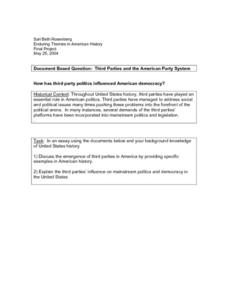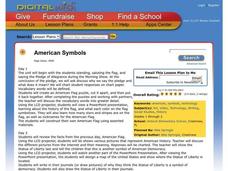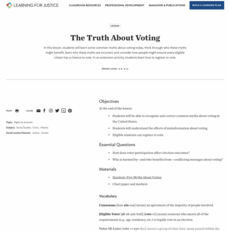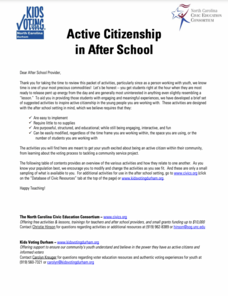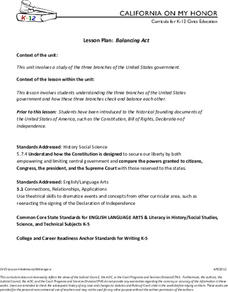Curated OER
Defined: The Different Types of Government
The world is a big place, so it only stands to reason that different forms of government exist. Democracy, autocracy, oligarch, monarch, and dictatorship are all defined. An extensive explanation of US government system is also included....
Teaching American History
A Word Fitly Spoken: Lincoln's Most Famous Speeches on Union
Abraham Lincoln's words carried American democracy through one of its most tenuous and violent moments in the nation's short history. Explore an interactive timeline that places events of the 19th century in the context of Lincoln's...
Curated OER
Preserving Democracy
Students read excerpts of the Declaration of Independence and United States Constitution. Using the documents, they identify the ideas of how the government should be run. In groups, they develop a skit that encourages people to be...
Curated OER
African Americans in Science
Students explore the careers of prominent African Americans in science, mathematics, and technology. They use The Faces of Science: African Americans in the Sciences website, which includes profiles of past and present African Americans...
Facing History and Ourselves
Taking Ownership of the Law
The work of building and maintaining a democracy is, in the words of Justice William Hastie, "never finished." To better understand what Hastie sees as an ongoing building process, class members listen to a seven-minute podcast about two...
City University of New York
Women's Suffrage and World War I
Democracy cannot exist where not everyone has equal rights. Discuss the state of democracy and women's suffrage during World War I with class discussions, debates, and primary source analysis, in order for class members to connect...
DocsTeach
Memorializing Abraham Lincoln in Washington, DC
The legacy of President Lincoln continues to endure. Scholars view images of three statues that have been created to honor President Lincoln. Academics analyze the three images and share their findings in a group discussion format. Young...
Anti-Defamation League
The Road to Brown
As part of the study of segregation in U.S. schools, scholars research and create a timeline of events that led to the historic Supreme Court case, Brown V. Board of Education. Groups research a topic or event that led to the decision,...
Our White House
The Our White House Inauguration Celebration Kit for Kids!
Get the youngest American citizens involved in the presidential election and inauguration with a set of social studies activities. Focusing on the history of presidential inauguration ceremonies, learners draft their own poems, design...
Carolina K-12
Compulsory Voting
Should voting in the United States be compulsory? In 2004, fewer than 60 percent of eligible voters cast ballots in the American national elections. After reviewing arguments for and against compulsory voting, your young citizens will...
Curated OER
A Literature of Democracy
Eleventh graders analyze how American literature shows a lot of different genres. In groups, 11th graders create a short report about the passage they have chosen.
Curated OER
Respect and Democracy
Students explore the concept of respect. For this respect and democracy lesson, students define respect and brainstorm examples of showing respect and disrespect. Students read Core Values of American Constitutional Democracy and pick...
Curated OER
AFRICAN-AMERICAN POETRY BEFORE EMANCIPATION
Explore poetry written by African-Americans before emancipation. 8th graders create collages, and explain why they chose specific stanzas. They display the collages on the class bulletin board that demonstrate an understanding of the...
Curated OER
Third Parties and the American Party System
Twelfth graders examine the role of third parties in American politics. Individually, they use primary source documents to write an essay on how third parties emergered and why. They also discuss the influence third parties have on...
Curated OER
American Symbols
Students explore the symbols of the United States. In this U.S. history lesson, students create an American flag puzzle and research facts on the flag. Students view a Powerpoint presentation on other symbols of America.
Curated OER
The Constitution & Native Americans
Students identify and consider US Constitutional origins in American Indian culture. They discuss and consider what it means to them to attribute the origins of the US Constitution to American Indian oral tradition. They compare the...
Center for History Education
Democratic Ideas of the 1776 Maryland Constitution
1776 was a year of political upheaval in the American colonies. Academics examine the Maryland Constitution to understand the desire to break with Great Britain. Young historians learn about Maryland's efforts to extend rights to its...
Teaching Tolerance
The Truth About Voting
True or False: Only Presidential elections matter. Academics delve into common voting myths to understand what is true and why the election process is critical to democracy. The lesson uses group discussion, activities, and handouts to...
Carolina K-12
Active Citizenship in After School
Active citizenship is the bedrock of any great democracy. Continue the trend by teaching the next generation about voting rights and the functions of elections in society. The variety of activities in the resource includes a human...
Judicial Learning Center
Rule of Law WebQuest
Go on a WebQuest to find the Rule of Law! Scholars use the Internet to learn all about how law works in a democracy and how the Rule of Law relates to both American government and governments around the world. Researchers then engage in...
Judicial Branch of California
Balancing Act: The Three Branches
What do hula hoops and the American system of government have in common? Using hands-on station activities, pupils consider the roles of the three branches of government. A script for teachers and writing prompts help round out a...
Teaching Tolerance
The True History of Voting Rights
Explore what voting rights really are in an intriguing instructional activity that explores the history of American voting. The resource examines the timeline of voting rights in the United States with group discussions,...
Judicial Branch of California
Public Service Announcement: Civic Responsibility
Get your message across. Scholars use their prior knowledge and artistic skills to create public service announcements. The project is designed to explain the importance of civic harmony and the responsibility of all citizens to...
National Endowment for the Humanities
The Power of the Majority over Thought
While Alexis de Tocqueville mourned a lack of "freedom of discussion" in America in the early republic, today's pupils are concerned about peer pressure. Using excerpts of de Tocqueville's writing and discussion questions, scholars...
Other popular searches
- Roots of American Democracy
- Basis of American Democracy
- Origins American Democracy
- Early American Democracy
- Native American Democracy
- Analyze American Democracy















